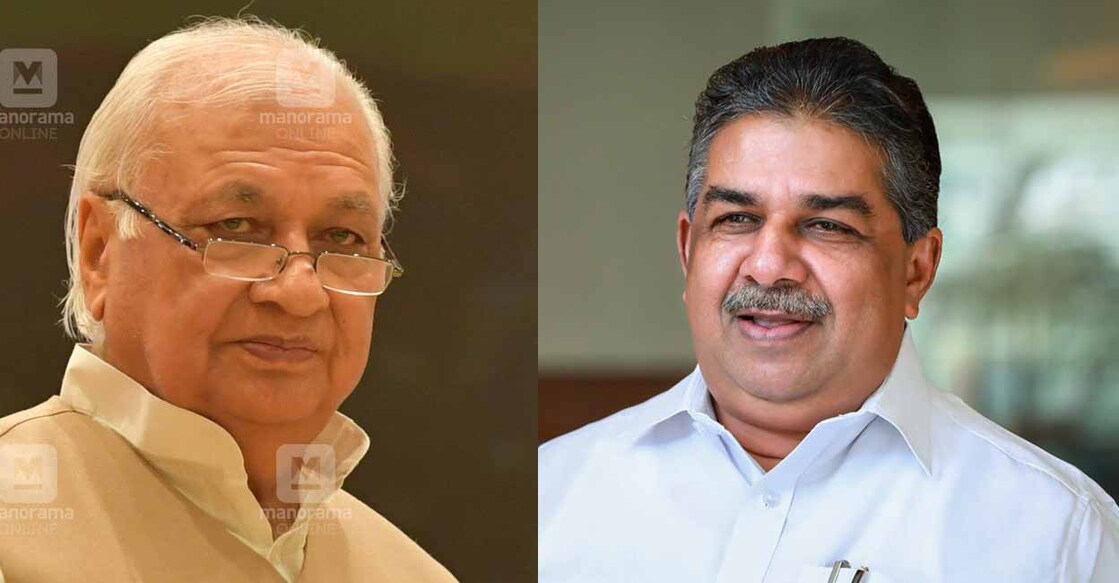Saji Cheriyan swearing in: What made a combative Governor Khan to give up so quickly

Mail This Article
On January 2, when he returned to Kerala from Delhi, Governor Arif Mohammed Khan sounded like he would somehow do his best to spoil CPM MLA Saji Cheriyan's re-induction party.
Even if he had to swear Cheriyan in, it was clear that Khan had no intention of holding the ceremony on January 4, the date chosen by Chief Minister Pinarayi Vijayan. At the airport on January 2, he made observations that hinted that the Chief Minister will not have his way. "I wanted to know at what level he (Saji Cheriyan) was exonerated (by the police)," he had said.
Sources in the Raj Bhavan said that the Governor wanted the case in Thiruvalla Judicial First Class Magistrate also to be settled before Cheriyan was brought back into the Cabinet. The CPM has been insisting that Cheriyan was exonerated by the High Court, masking the fact that the court had not specifically dealt with Cheriyan's supposed insult of the Constitution. A case under the Prevention of Insults to National Honour Act, 1971, was dealt with by the Thiruvalla Judicial First Class Magistrate Court.
The Governor's intention was obvious. This was his chance to keep a government, which lost no opportunity to snub him, on the edge. Governor Khan wanted the CPM and the LDF government pushed into a state of uncertainty.
Raj Bhavan sources were also keen to point out that the Governor had received legal advice that he could delay the swearing-in till he was fully convinced that Cheriyan was unencumbered by any legal hindrances.
However, the situation changed in a flash. The very next day, on January 3, without even waiting for the wide-ranging legal consultations he had hinted the day before, Governor Khan consented to conduct the swearing-in ceremony on the day fixed by the Chief Minister.
Khan sounded like a man who had abandoned the fight halfway. "Whatever advice I had to give I had given the Chief Minister and this is not something that I would want to discuss with you," he told reporters on January 3. Then, in a very resigned tone, he said: "Ultimately, his (the Chief Minister's) advice is binding on me."
Even after pocketing legal advice that he was well within his powers to delay the swearing-in, what made the Governor give up the fight abruptly? According to top sources, Khan was prompted by both political and legal reasons.
"He had received top political advice that it would be unnecessary to take on the CPM on an issue that had the potential to embarrass the party even if Cheriyan was sworn in without delay," the source said.
The thinking was that the Thiruvalla Court, which had in the first place directed the police to probe Saji Cheriyan's allegedly anti-Constitutional remarks, could throw out the clean chit given by the police. "If this happens, the CPM would be once again in the dock," the source said.
On the other hand, if the Governor was throwing in all sorts of hurdles, the CPM's larger political narrative that the Centre was using governors to weaken and undermine non-BJP state governments could gain a semblance of credibility. "This could even give the CPM some sympathy, the last thing the Governor wants," the source close to the Governor said.
Further, the Governor was also told to pick his fights wisely. "If he was trying to get his way in a situation like swearing in a minister where a governor has no power whatsoever, it will be counterproductive. It might also give the impression that the Governor is a vindictive man," the source said.
However, what tipped the scale was the legal advice that an MLA could be sworn in even if the Governor was unwilling to host the ceremony.
In Article 188 of the Constitution, which deals with the swearing-in, an MLA has to make his oath before the Governor or some person appointed by the Governor. This is a Constitutional ritual that cannot be broken on a Governor's whim.
Khan was told that there was at least one instance in the country when an MLA who was to be made a minister just sent his signed oath, as prescribed in a form provided in the Third Schedule of the Constitution, to the Governor who had refused to swear him in. The MLA became minister without any trouble.
In other words, the Governor was told in no uncertain terms that it was his Constitutional duty to swear in a minister when the Chief Minister advises him to. Unlike in the case of giving assent to bills passed by the Legislature, which the Governor could delay indefinitely, the Governor had no choice but to give his consent.

